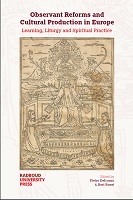Observant Reforms and Cultural Production in Europe
Learning, Liturgy and Spiritual Practice
Contributor(s)
Delcorno, Pietro (editor)
Roest, Bert (editor)
Language
EnglishAbstract
The impetus of religious reform between ca. 1380-1520, which expressed itself in a variety of Observant initiatives in many religious orders all over Europe, and also brought forth the Devotio moderna movement in the late medieval Low Countries, had considerable repercussions for the production of a wide range of religious texts, and the embrace of other forms of cultural production (scribal activities, liturgical innovations, art, music, religious architecture). At the same time, the very impetus of reform within late medieval religious orders and the wish to return to a more modest religious lifestyle in accordance with monastic and mendicant rules, and ultimately with the commands of Christ in the Gospel, made it difficult to wholeheartedly embrace the material consequences of learning, literary and artistic prowess, as the very pursuit of such pursuits ran against basic demands of evangelical poverty and humility. This volume explores how this tension was negotiated in various Observant and Devotio moderna contexts, and how communities connected with these movements instrumentalized various types of writing, learning, and other forms of cultural expression to further the cause of religious reform, defend it against order-internal and external criticism, to shape recognizable reform identities for themselves, and to transform religious life in society as a whole.
Keywords
Cult of Saints; Pastoralia; Pastoral Care; Religious Architecture; Church Music; Liturgy; Book Production; Manuscript Culture; Religious Orders; Devotio Moderna; Observant ReformsDOI
10.54195/XFRB6134ISBN
9789493296084Publisher
Radboud University PressPublisher website
https://radbouduniversitypress.nl/Publication date and place
Nijmegen, 2023Classification
History of art
Prehistoric styles
History and Archaeology
CE period up to c 1500
Theory of music and musicology
Religion: general
Christianity
Sermons


 Download
Download Web Shop
Web Shop